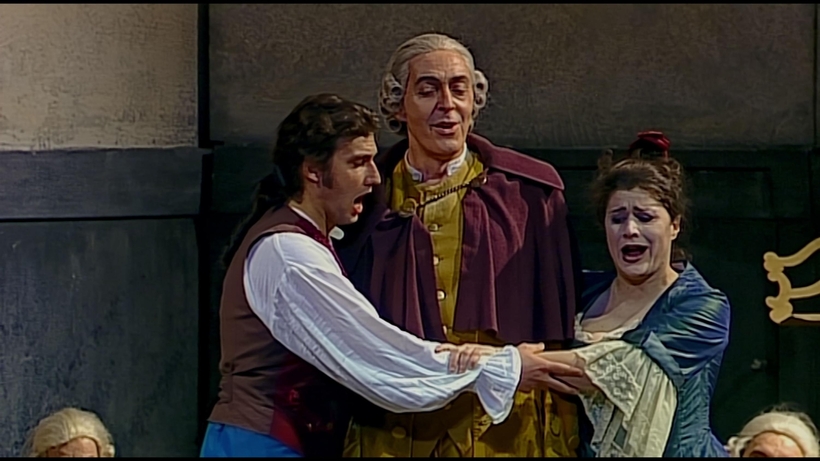As the eponymous “girl who went mad for love,” Cecilia Bartoli chews the scenery at the Zurich Opera House only figuratively, pulling faces, throwing things, and pounding her fists on the floor. On the other hand, she carries a bouquet of fake scarlet poppies, and these she does chew on. Literally.
Bartoli’s live video of Giovanni Paisiello’s Nina, o sia La Pazza Per Amore dates to March 19, 2002, early in her remarkably enduring prime—and if her histrionics raise eyebrows, her vocalizing adds up to a clinic in mellifluous, deeply felt musicianship, in perfect harmony with Paisiello’s pristine classicism. In this, Bartoli and the conductor Adam Fischer are birds of a feather. The adolescent Mozart learned much from Paisiello—and while Mozart soon surpassed Paisiello, who was 14 years his elder, he never abandoned their common language.
Things get meta when Nina coaches—in spoken dialogue—a chorus of listless village lasses who sing a love lament she has written. Her exacting instructions harp on exactly the themes Mozart sounded when he sent the tempestuous, ultimately sublime concert aria “Ah, lo previdi” to the soprano Aloysia Weber, whom he hoped to marry. (Instead he wound up, very happily, with her less talented sister Constanze.) “I advise you,” Mozart wrote Aloysia, “to observe the expression marks—to think carefully of the meaning and the impact of the words—to put yourself in all seriousness into Andromeda’s situation and position!—and to imagine that you really are that very person.” As Nina, Bartoli takes time out to interpolate Andromeda’s aria, and it beams like the Koh-i-Noor.
A pan-European smash in its day, Nina epitomizes the Romantic cult of sensibilité, or delicacy of feeling. Nina possesses this virtue in spades. But her world shatters when her father, a count, withdraws his blessing for her to wed the Candide-like Lindoro in favor of a suitor with deeper pockets. The rivals clash, Lindoro falls, yet dad still insists that Nina marry the other guy. Instead, she withdraws to the tuneful fugue state where she remains throughout the opera, a model for Lucia di Lammermoor and countless other bel canto brides in extremis.
A pan-European smash in its day, Nina epitomizes the Romantic cult of sensibilité, or delicacy of feeling.
Cesare Lievi’s diplomatic period production appears to take Nina’s sentimental tragedy at face value. Notice, though, how the villagers of the saccharine entourage Nina showers with precious gifts not only bow and scrape but also quietly abscond with her furniture. Aside from the social critique, Lievi contrives also to reveal the crux of the action from the heroine’s point of view. As you’d have to expect, the Count and Lindoro return (the duel wasn’t fatal after all), but can a father’s remorse and a lover’s care restore her lost reason?
To Enlightenment audiences, the question was rhetorical. Lievi’s answer is ambiguous. A clue lies in the twin figures of a shepherd, whose rustic ditty is accompanied by a bagpipe, and the undead Lindoro, who expresses himself in a heart-catching proto-Mozartian vein.
Paisiello assigned the parts to one singer yet conceived of them as two distinct persons. Here, both fall to the young Jonas Kaufmann. Earnest yet radiant, he bears the stamp of coming stardom, artfully blurring the line between actuality and Nina’s projection.
Nina is available for streaming on Deutsche Grammophon’s streaming platform, Stage+
Matthew Gurewitsch writes about opera and classical music for AIR MAIL. He lives in Hawaii

